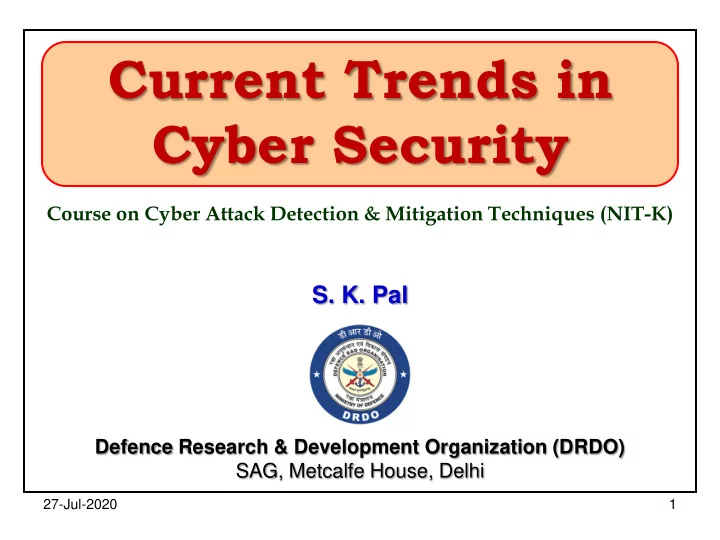

Current Trends in Cyber Security Course on Cyber Attack Detection & Mitigation Techniques (NIT-K) S. K. Pal Defence Research & Development Organization (DRDO) SAG, Metcalfe House, Delhi 27-Jul-2020 1
What is Cyberspace? Refers to the digital world of computer networks Components of cyberspace: Hardware (communication, networking, IT), software (OS, browser, antivirus, apps) & data (in the memory, disk, cloud). Other components: Cognitive users & cyber personas. Gadgets, sensors & data: Huge amount of data is generated – 2.5 exabytes / day. Negative impact: psychological, physiological. Browsing habits & psychographic profiling. 27-Jul-2020 2
Useful Applications Requirements: Availability, QoS, Confidentiality, Privacy, Authenticity, Integrity 27-Jul-2020 3
Data – a Valuable Resource Data – the most valuable resource. Sensitive & personal data. What is your personal data? Legal implications: GDPR, Data Protection Bill, IT Act 2000. Surveillance state & privacy index. Data breaches & information leakage: Who is responsible? 27-Jul-2020 4
Research Problem: Protection of sensitive & personal data using technology and policies Research Problem: Identifying the technical reasons (attack surface, attack vectors) for recent data breaches & development of mitigation strategies 27-Jul-2020 5
The Human Factor Human aspect of cybercrime • Focusing only on the technical side won’t help to curb cybercrimes. • Smart hackers & cybercriminals first measure victimization by online engagement (email or social media) and by studying online behaviour e.g. impulse online shopping, playing online games, downloading music, visiting specific websites etc. • People who show signs of low self-control are found more susceptible to malware attacks. 27-Jul-2020 6
The Human Factor • Phishing, spear phishing, pharming, smishing, vishing. • Mobile phones and app permissions. • Personal information sharing on social media. • Free WiFi, free downloads, free malware! 27-Jul-2020 7
Reasons for Cyber Breaches Using old OS, browsers, antivirus, unpatched IT resources and application software . Responding to unknown emails (links, attachments). Visiting unknown / suspicious websites . Storing classified / personal information on Internet PCs , laptops & smartphones . Unauthorized use of USB-drives / removable storage. Irresponsible use of smart phones & social media . 27-Jul-2020 8
Cyber Crimes in India • Website hacks & defacements. • Data & information thefts. • Phishing attacks on E-commerce & financial websites . • Cybercriminals targeting social & professional networks . • Cybercrimes targeting mobile platforms (smartphones & tablets). 27-Jul-2020 9
Other Cyber Crimes • Identity theft . • Data exfiltration, company secrets, IPR. • DoS, DDoS. • Ransomware infection. • Crypto-mining. • Supply-chain infection. 27-Jul-2020 10
Misuse of Information • Surface web • Dark web • Deep web • TOR encrypted sites & traffic 27-Jul-2020 11
Research Problem: Cyber security recommender system for web browsers & mobile devices Research Problem: Identification & analysis of TOR traffic (in the organization) 27-Jul-2020 12
Information & Cyber Warfare Concept involves the battlespace use & management of ICT in pursuit of a competitive advantage over an opponent . Involves collection of tactical information , spreading of propaganda or disinformation to demoralize or manipulate the enemy, disrupting/denying victim’s ability to gather & distribute information. Makes use of technology . Also focuses on human-related aspects of information use. e.g. misinformation & fake news. 27-Jul-2020 13
Cyber Attacks Home devices - Web cameras, climate control devices, door locks, refrigerators Medical devices – Insulin pump, paceamaker Car electronics Hospital, bank servers (ransomware) Critical systems – energy grid, nuclear power plant 27-Jul-2020 14
Cyber Warfare • Cyberspace is now considered as the fifth domain / dimension of warfare. • Nature of cyber warfare is asymmetric. Incoming attacks are not predictable. • State actors have become active in the cyberspace (Stuxnet, Flame, Gauss, Duqu...). • Like nuclear weapons & missiles, new cyber-weapons (anonymous, zero-day) are being developed by many countries. 27-Jul-2020 15
The Road Ahead Large volumes of data are generated every moment. Its’ proper use & protection is crucial. Apart from technology, human factor plays a vital role in cyber security. Cyberspace is the new dimension of warfare. Machine Learning is a lucrative tool both for cyber defence and cyber attacks. The present crisis has widened the horizon of cyber threat landscape . Organizations should quickly adapt to these changes and pay more attention to cyber security . 27-Jul-2020 16
Thanks for your attention ? skptech@yahoo.com 27-Jul-2020 17
Recommend
More recommend